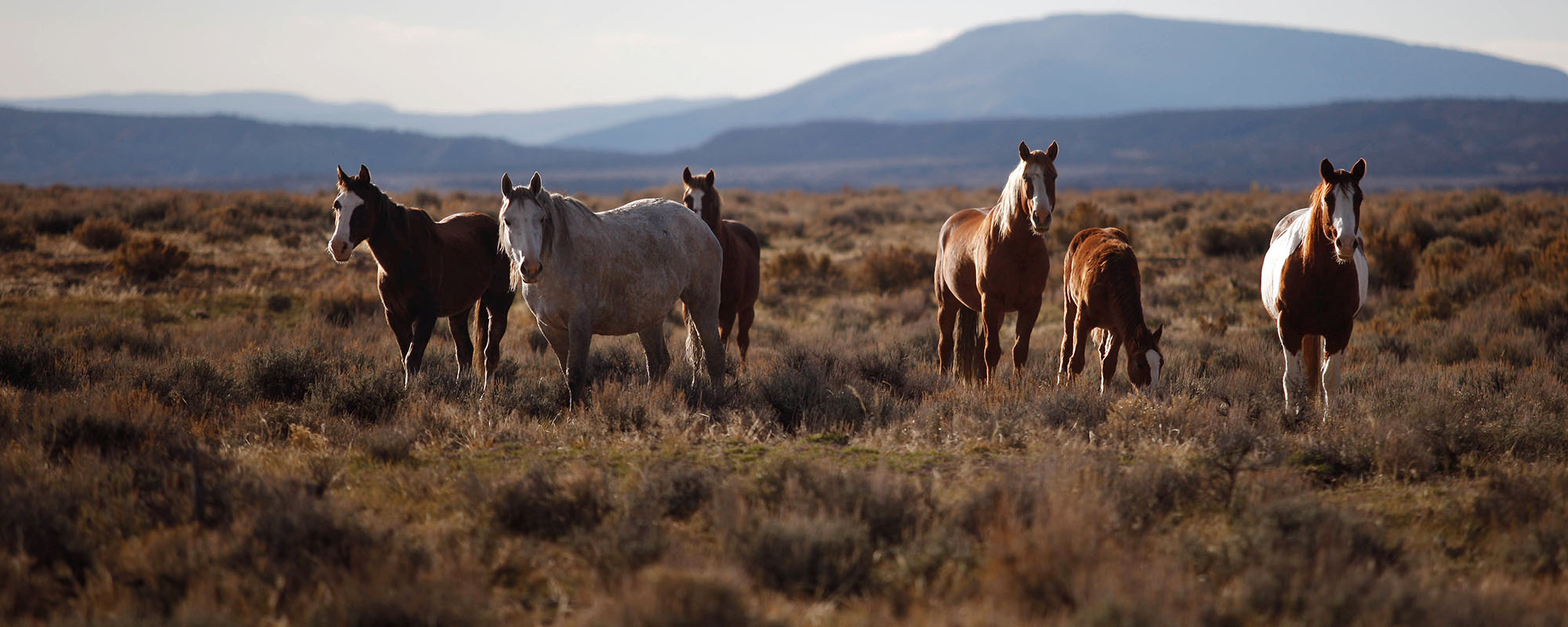By Sara Amundson and Kitty Block
It’s a long way from the arid desert habitat where a wild horse now named Smoke was born, but now Black Beauty Ranch, in Murchison, Texas, is home. The journey to our sanctuary has made all the difference for this handsome grey horse who has traveled all the areas of the sanctuary, bonding with the other mustangs. Smoke grazes peacefully watching over his friends who were once separated but are together again. No one can harm him here.
Now, we can say for certain that Smoke is one of the lucky ones. He didn’t know it, but on the range Smoke was vulnerable because of how wild horse and burro populations are managed—something that can change depending on political turnings of the tide. For years, an adamant faction in western states has targeted wild horses and repeatedly sought to exterminate them. Those interests have politicized the very existence of the wild equids who have long personified the freedom, vitality and romantic mythology of the American West.
Now, wild horses and burros may be in danger once again, as the White House's Fiscal Year 2026 budget request attempts to remove longstanding protective language that prohibits the outright killing or sale for slaughter of wild horses and burros.
In the past, the Bureau of Land Management has come under scrutiny because of claims of inhumane wild horse and burro roundups and equids ending up in the slaughter pipeline. We have never been naïve or reticent concerning the Bureau’s weaknesses. And in recent years, with key partners, we have tried to reshape the agency’s approach in order to emphasize humanely conducted gathers, responsible adoption and sale of animals, expanded capacity for off-range facilities and pastures for holding them, and effective reliance on fertility control measures. Even influential members of the ranching lobby have worked together and with us and other groups since the beginning of the previous Trump administration to build broad consensus and support around sustainable wild horse and burro management policies. The transfer of Smoke and other horses to Black Beauty a few months ago was an outgrowth of that humane and practical approach. Unfortunately, despite congressional support for the plan, and all the work these groups have done to try and reshape the program, the Bureau of Land Management under both Republican and Democratic administrations never embraced it. And now, these magnificent animals are in jeopardy.
Tens of thousands of wild horses and burros on our ranges are seriously threatened now because of a proposed funding cut to the program intended to manage wild equid populations. Such management is called for by law, the Wild Free-Roaming Horses and Burros Act (1971). It is particularly chilling that the Project 2025 Mandate for Leadership document includes a call for allowing the Bureau of Land Management to “dispose” of wild horses and burros because they pose an “existential threat” to public lands.
Such a claim is absurd. And yet, some have chosen to pin the blame for range degradation on the approximately 73,000 wild horses and burros on these public lands. For instance, during a recent congressional hearing, Secretary of the Interior Doug Burgum was asked to commit to a solution for managing wild horses and burros, and he responded with the following: “...unconstrained wild horses and burros are causing more damage to grasslands than any other species and we have to have a solution. They’re causing damage and we’re spending over 100 million dollars trying to manage it and we’re not being effective in how we’re managing.” It seems odd to blame range degradation on equids when many factors have negative environmental impacts on the lands, including, the estimated 1.5 million cows and an unknown number of sheep grazing on those lands, as well as energy development, mining and timber harvesting on western public lands. The proposed abandonment of protective language for wild horses and burros may well be someone’s idea of a cost-saving measure, but these animals could pay for it with their lives.
We are determined to fight for wild horses and burros. We’ve fought off reckless and cruel proposals to kill them for years, and we’ve always been able to count on a singular truth: Public support for their protection, as icons of America’s rugged free-roaming spirit, is high, and that keeps our spirits high, and our resolve unbroken. Please stand with us, and act with us, to ensure the future of every living wild horse and burro caught in the crosshairs.
Kitty Block is CEO and president of Humane World for Animals.




